Septic systems with pumps usually have some warning signs to alert the homeowner if something is wrong. If the water level in the pump tank gets too high, or sometimes even too low, the alarm will go off. Most alarms will show a red light and a sound. If the alarm sound is in silent mode, only the red light will show.
When the septic alarm goes off, you should silence it. Then check the electricity to see if the pump has power. Do not use a lot of water and wait for 12 hours. The pump will finish a couple of cycles and possibly remove the excess water. If that’s not the case, inspect the system or call a professional.
As a homeowner, you should know how your septic system works to recognize and understand basic problems. Not because it is a nice thing to know, but because, according to the EPA, your Septic System is your responsibility. You are probably thinking like me: Don’t I have enough with figuring out why my smoke alarm is beeping or chirping intermittently?
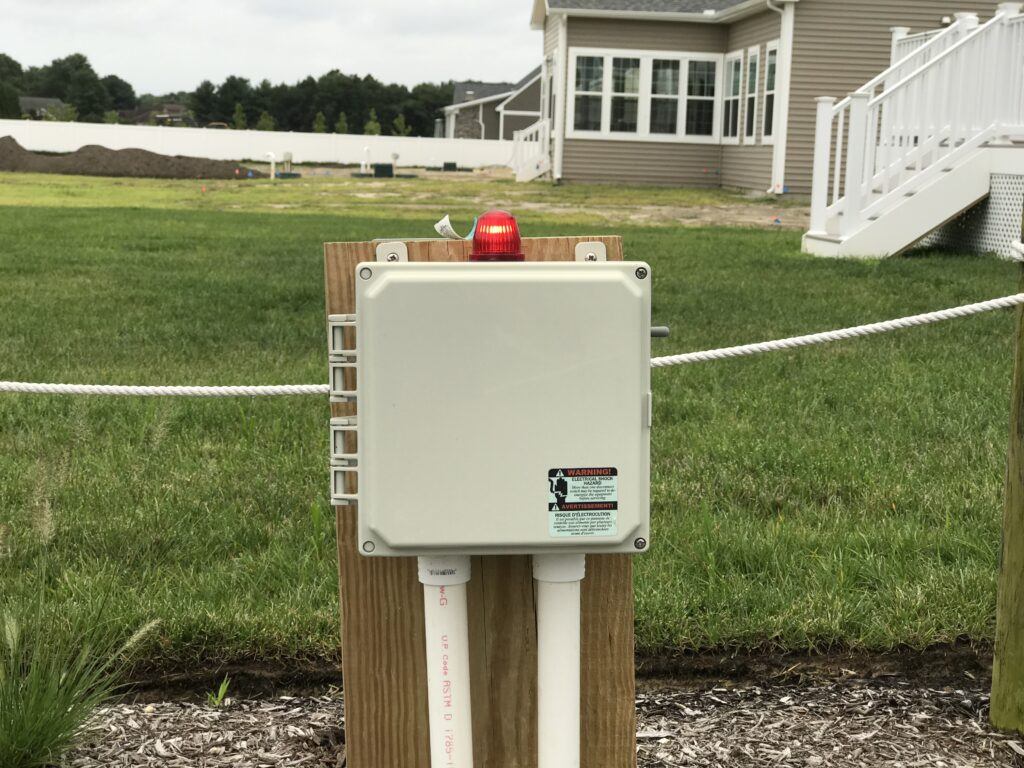
We had been in our new house in Lewes for a couple of weeks when we noticed a red light on the top of our septic control box. I have never had this type of system, so I had no clue what to do.
So I went into the internet, talked to a few neighbors, and eventually got a technician to come over, and this is what I learned.
Let’s first understand why there is an alarm in your septic system.
What is a Septic Tank Alarm, and How It Works?
Septic tank alarms have one primary purpose: to inform you that the water level inside the pump tank is too high.
Depending on the size of your tank, water consumption, and a few more technical features, the pump will remove wastewater every few hours. Modern septic systems have a timer inside the control box to establish when water should be removed and for how long.
Most timers are set to pump two or more times (cycles) a day, which should be sufficient to accommodate most household usage.
Wastewater is pumped into the drain field in cycles to prevent overflowing. Pumping too much water into the drain field can cause damage.
All the water that gets into the system between those pumping cycles will remain in the pump tank. If there is more water than usual, the water level will rise. As the pump can work for a specific amount of time, it may take more than one pumping cycle to remove the excess water.
When the water level is too high, the alarm will go off to warn you.
The rising water level can be a huge problem, and proper maintenance of the system is essential. If everything is working correctly, you can rest assured that the alarm will inform you about a potential problem.
Usually, the alarm goes off if the water level is too high, but it could also go off when the water level is too low. If the pump has no water to pump out, it could potentially damage the pump.
Get to Know Your Septic System
Not all septic systems are the same. Get to know yours, even if you never had a problem. I didn’t have that luxury –we were barely unpacked when the alarm went off. LOL!
Locate the alarm box. Some have buttons to turn the alarm off, while others have switches. Open it to see the visible parts. When you know how it is supposed to look, you will notice if something is out of order.
There are two lights on the box, green and red. Green one should always be on, as it indicates that the alarm has power. Red light and a sound mean that the alarm is on because it is receiving a signal that the water level has reached a limit within the septic tank. You may not hear a sound if your alarm is in silent mode (mute).
===> These are 10 things that you should know about your septic system
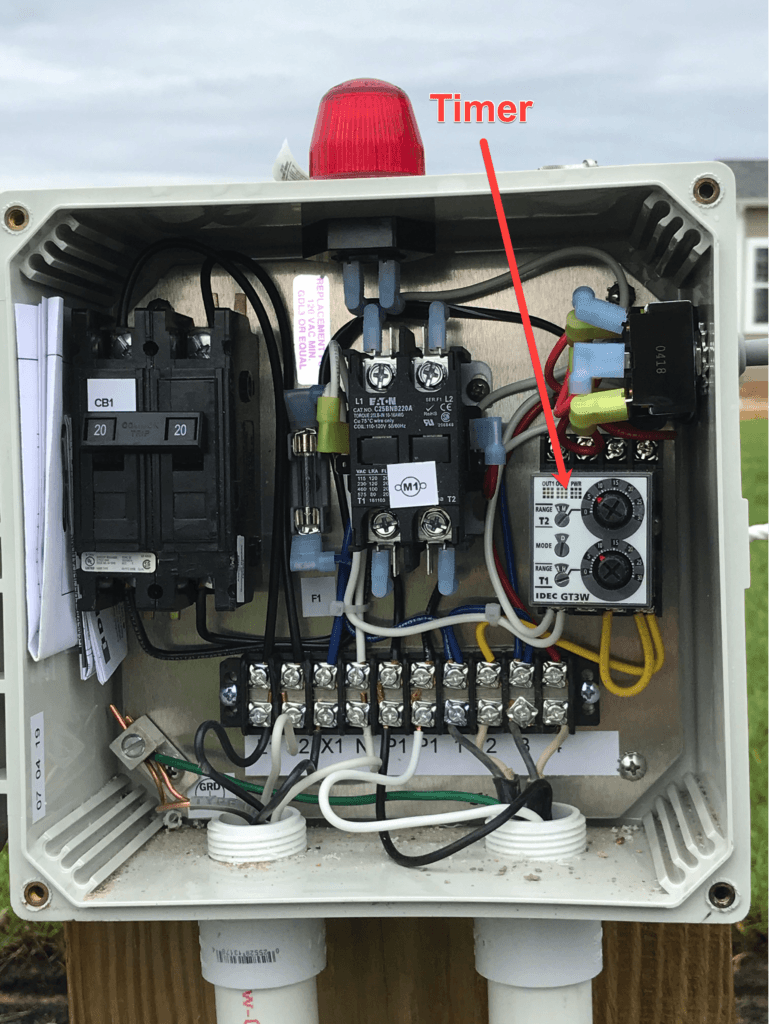
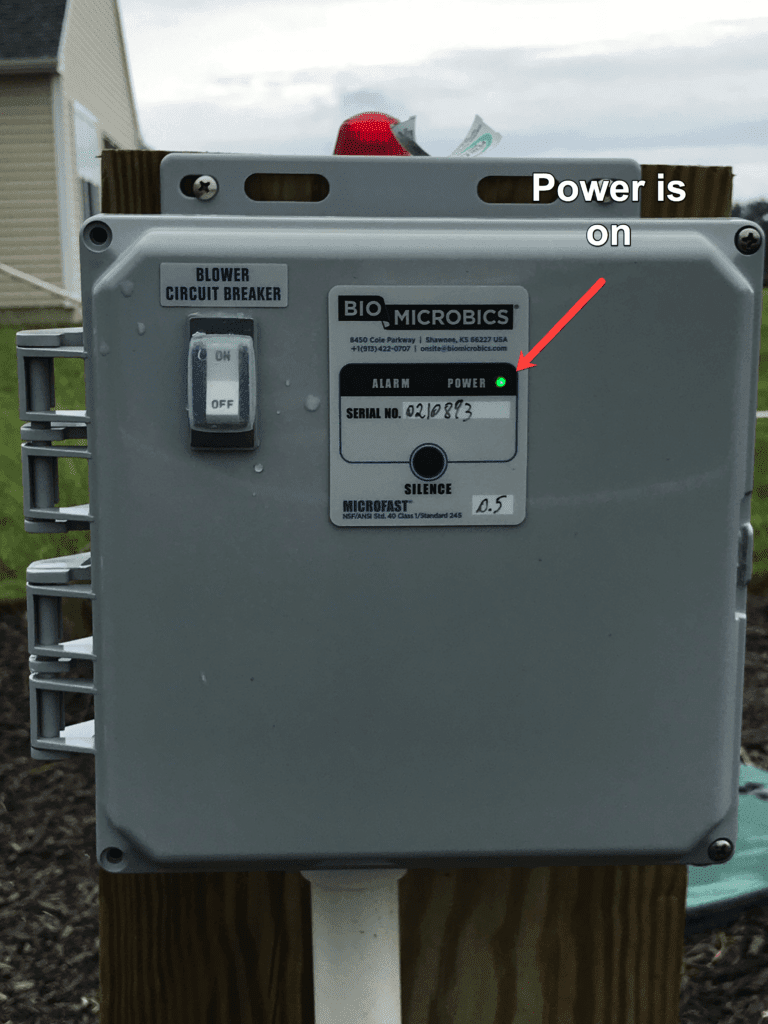
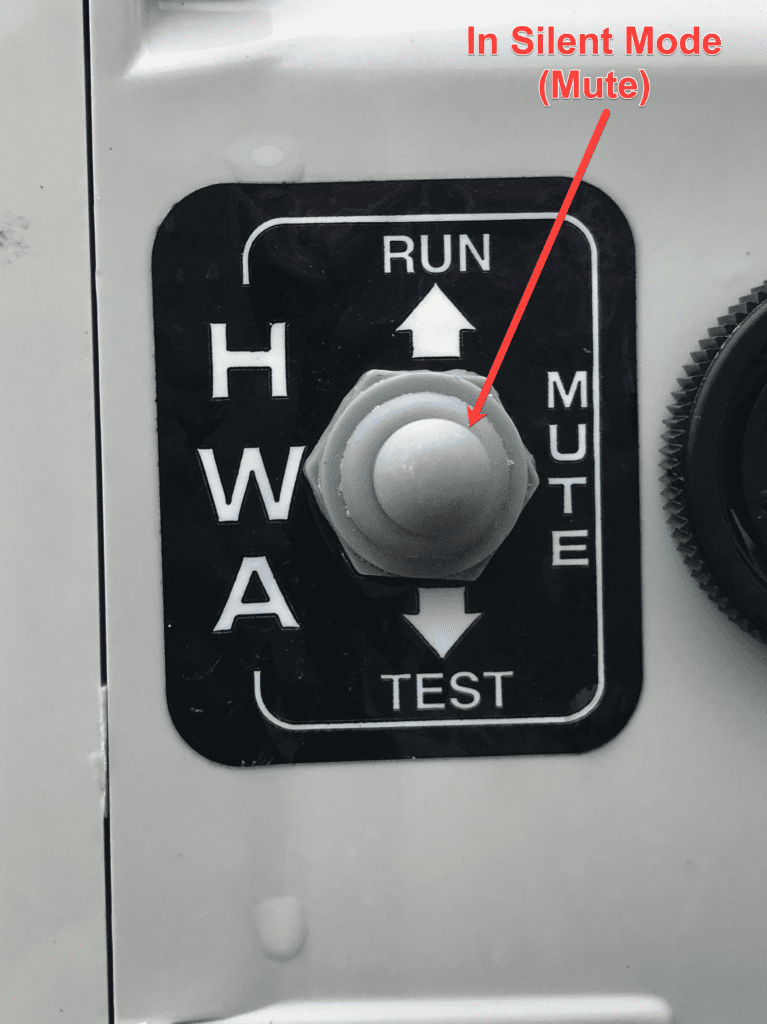
Two Main Things to Do When the Alarm Goes Off?
First of all, you don’t have to panic.
Modern septic systems are designed in a way that you have enough time to reduce water usage and diagnose a problem before the system overflows. The alarm means that the water level is increased, not that it will burst out in a few seconds.
When the septic alarm goes off, follow these next steps:
- Locate the control panel. Press the button, or a switch, to silence the alarm (if there is a sound). In my case, I didn’t have a sound because mine was in mute (see picture above).
- Reduce your water usage to a minimum until the problem is resolved. Stop using your washing machine, dishwasher, and similar appliances that use water. And shower if you have to, but keep it short.
Why is My Water Level Elevated?
Most of the time your septic system alarm will go off because the water in your tank is higher than it should be. Let’s go over the most common causes of this.
Power Problem
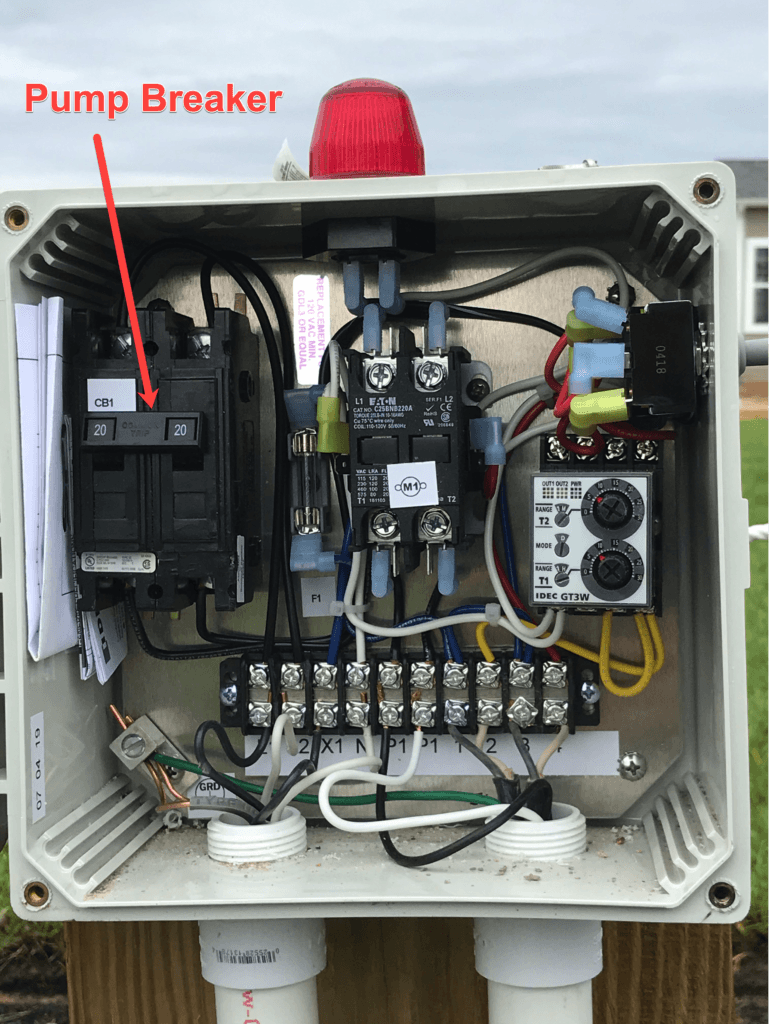
Pumps are powered by electricity. If there is a power shortage or any power problem, your pump will not be able to remove water from the tank.
Check the main circuit breaker for your septic system to see if there is power to your septic system.
Don’t forget to check the pump breaker in your control box if you have one. That can also be off. This was actually my problem. Apparently, the electrician who installed it left it off and the system was never on for the two first weeks we were in our house. Therefore the alarm went off once the water got too high in the tank.
Also, check the outlets where the pump is plugged in. If you suspect a power problem, but you can’t resolve it by yourself, contact an electrician.
If the electricity is working, but the pump is not, then it is a pump problem.
Increased Water Usage
Your septic system has a specific capacity, and the pump is programmed to push water out based on that capacity.
If you are using a lot more water than usual, the level could rise. Excessive laundry, frequent showers if you have guests, or even washing a lot of dishes could increase the water level. The same goes for excessive cleaning that requires a lot of water.
You know how much water you usually use, and you can easily recognize this as a reason for the alarm to go off. Luckily, this problem should resolve itself once you go back to normal usage.
Heavy Rain or Floods
Bad weather can be the reason why your tank is full. Heavy rain or floods will soak the soil around the tank. Standing water around the tank could potentially find a way in, especially if there are any cracks in your tanks.
A lot of rainfall can also flood the ground around the drain field, preventing water from flowing out of your septic system.
The first thing you should do in this case is to reduce your water usage to a minimum and wait until the soil dries out and the pump removes the excess water in the following cycles.
If it is not solved by itself, I would call a professional.
Clogged Effluent Filter
The effluent filter should be cleaned regularly, usually twice a year.
The filter is a screening barrier to decrease the volume of solid material passing out of the tank into the drain field, which, in my case, it is a mound system. The filter is located on the tank’s discharge port.
Solid debris can clog the filter and slow down the water flow. The excess water will remain in the tank longer than it should, new water will come too, and the level will rise.
If you are unable to find any apparent reason for the increased water level, usually it is the filter. Clean it as soon as possible, reduce the water usage, and wait for a few pump cycles to see the results.
Pump or Float Failure
Some septic systems, like mine, have submersible pumps, which are equipped with floats that control the pump in addition to the timer. When the water level reaches a specific elevation, the float will register it and turn on a pump. The float temporarily overrides the timer until the effluent in the tank gets back to normal levels.
If the float is out of order, it will not be able to control the pump, and the water level may rise. The same goes for a faulty pump. If the pump is not working or working on reduced capacity, the water level will increase.
Maintenance of the pump is essential to ensure the efficiency of the system.
To figure out if it is a pump or float issue, you can follow these steps:
- Locate the control panel
- Move the switch to manual mode
- If the pump starts, and the water level drops, the problem is with the float
- If the pump does not start, the problem is probably the pump itself
In my opinion, pump or float issues are not easy DIY projects, so I would call a professional.
What About the Blower Alarm
You may also have an additional alarm to worry about if you have a blower system.
Aerobic septic tanks like mine, use a blower system to force air into the treatment tank. This system ensures the production of oxygen for the maintenance of bacteria, which digest the waste.
Without this system, solids would not become liquids.
If your blower alarm is going off, your blower may be out. I would call a qualified professional to troubleshoot the problem.
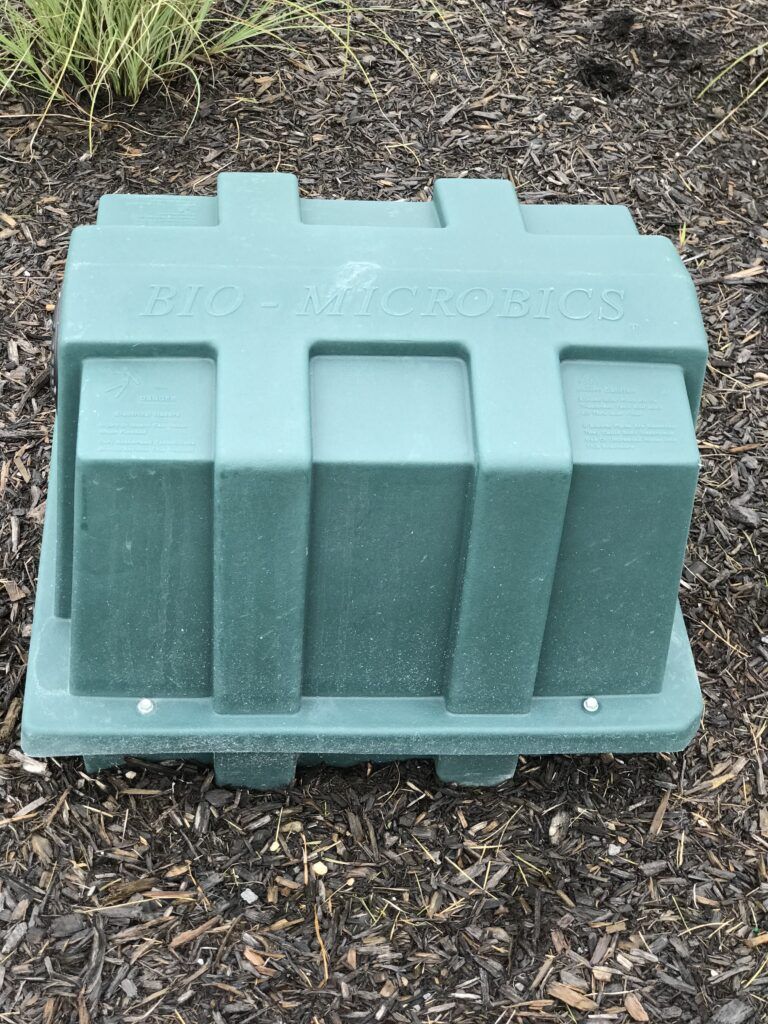
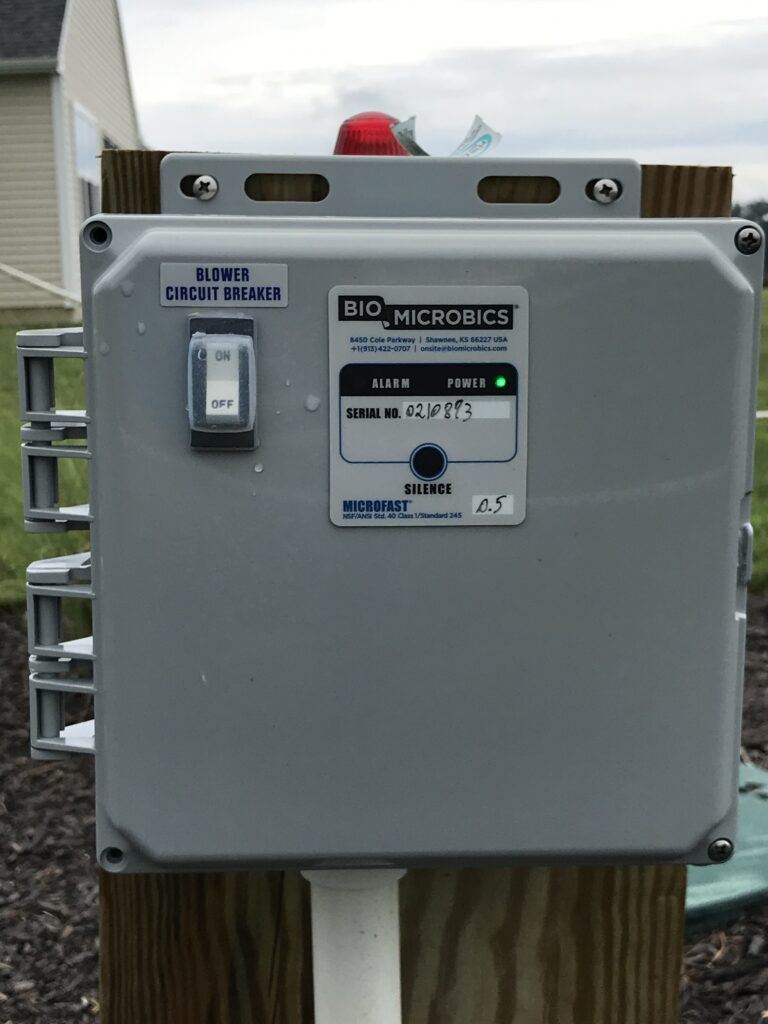
Closing Thoughts
It is important to mention that some of these problems can be continuous. If you notice that they are too frequent, you should consider improving your septic system, replace faulty parts, or repair them. Either way, consulting a professional is necessary.
These frequent problems usually occur if there is a permanent change in water consumption. For instance, a few more people moved in. Now everyone uses the shower, laundry, and dishwasher. Unfortunately, increasing your septic system’s capacity requires a lot of work, and the cost can be high.
There is one thing that has to be avoided at all costs: ignoring the problem. The increased water level won’t just disappear. It may cause the drain field to overflow. Another possibility, although not so frequent, is that the sewage backs up into the house through the pipes. Those problems will cost a fortune and are more complicated than any of the minor issues that cause increased water levels.
Update: My Septic Alarm is Going Off Again
One week after the septic system technician came to troubleshoot our problem, the alarm went off again.
The first problem was due to the pump breaker being in the “off position.” The technitian believed that the electrician who installed it may have forgotten to put it back on.
He manually pumped the system and thought that solved the problem. We now have the alarm again, but this time the pump breaker is on. I also checked the main circuit breaker and is on. So, this doesn’t seem to be a power issue, but the water is higher than it should be, which means the alarm switch is working well.
It should most likely be a pump or float issue, which is odd since this is a brand new system. Since we are within the 1st year construction warranty, I will call the septic system company and let them troubleshoot it. I will update the post when the problem is solved.

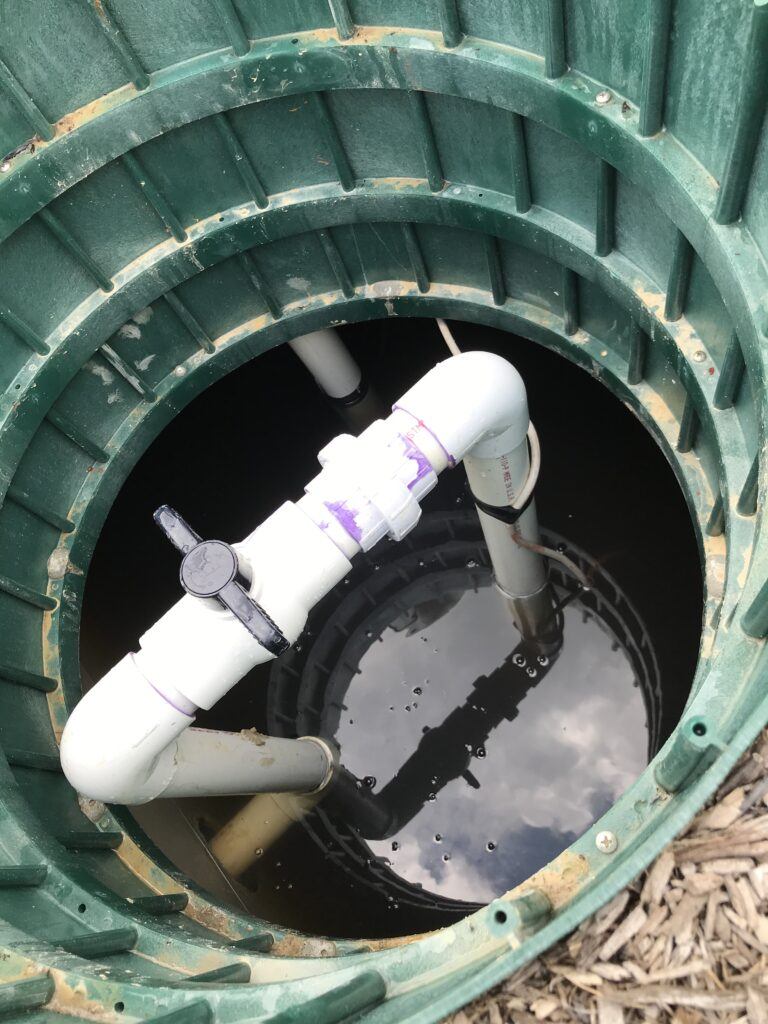
Technician Came to Troubleshoot the Problem
The septic system technician came and concluded that there’s nothing wrong with the system. He believes we may have a leak somewhere in the house, probably in the toilets.
He manually pumped it until the water level went down enough.
I’m afraid I have to disagree with him. I checked the three toilets we have and saw no leak at all. This septic system is built to accommodate 8 people, and we are currently two living in the house.
The system is set up to pump three times a day for 10 minutes cycles, and if this doesn’t work, the float should kick in. Even with a small leak, the alarm should not be off, in my opinion.
I talked to the builder, and he will speak to the company’s manager and get a feeling for it. I will update the post with additional information.
Let me know in the comments what you think the problem may be.
Update: A Manager Asked the Technician to Come Again
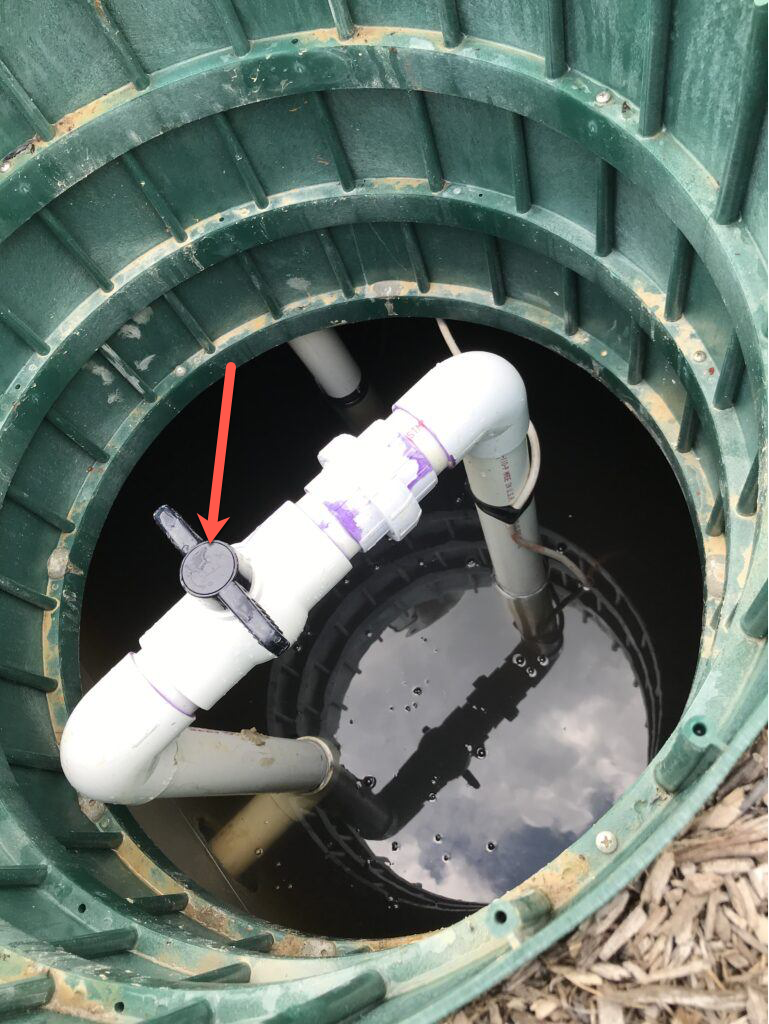
After I talked to the builder, the technician was asked to come back and ensure everything was working correctly. I mentioned that there was no leak anywhere in the house. So, the issue had to be something else, and it may happen again if we don’t fix it.
He concluded that it might be an issue with the amount of effluent that goes out with each pumping cycle. So, he increased that amount a little by adjusting the effluent control valve, shown in the picture below.
I am hoping the problem is gone. Since then, I have not had an issue, even though we recently used significantly more water because my son and girlfriend visited us.
I want to thank Scott for commenting below and reminding me that I hadn’t updated this part of the post.
Related Posts:




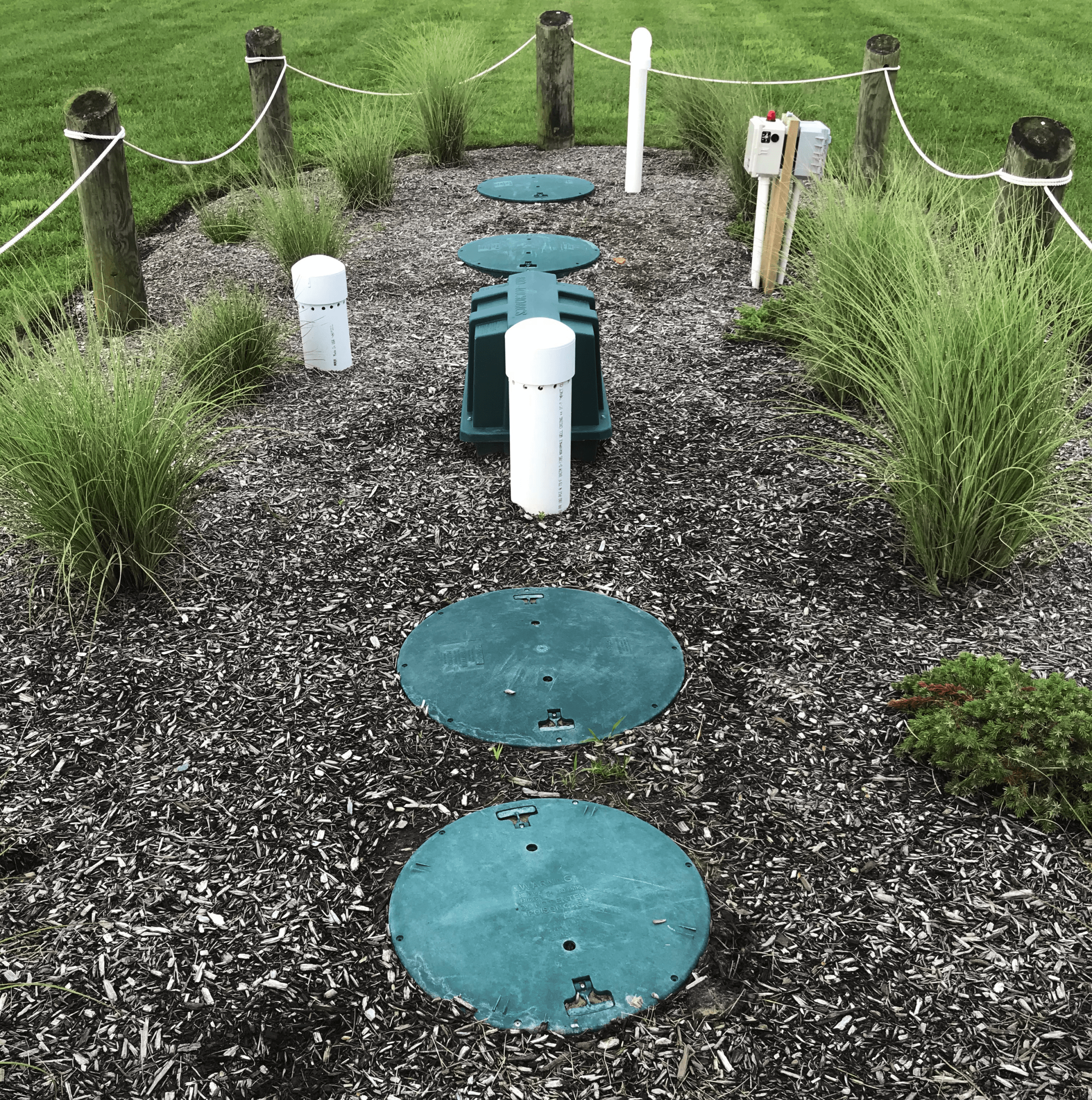
I am living chapter one of this story. I have a new house with a warranty, and the septic alarm is going off. I have a sneaking suspicion that I’ll find myself in the same position where you left this story.
What happened next?
Hi Scott,
Thank you for stopping by.
A technician came again, and he increased the effluent flow rate. That is, he raised the amount of effluent that goes out to the drain field with each pumping cycle. That seems to have fixed the problem.
It was definitely not due to a leak in any of the toilets.
My son and his girlfriend came and visited us recently, and we didn’t have any issues with it despite the additional water usage. So, I am hoping it doesn’t happen again.
Thank you for reminding me that I need to update the article. I will wrap it up today.
Jose
I recently had the septic pump and floats replaced. The pump alarm went off and would not shut off until I turned it off at the breaker. I checked the water level in the pump chamber and it was normal. This sounds electrical but I am not sure.
Hi Gerry, thank you for stopping by. Since the water level is normal, there could be a problem with the new pump float switch. The float itself could be defective or may have been installed incorrectly. I am not an expert on this, but if the issue continues, I would contact the company who installed it and see if there is anything wrong with what they did.
Anyhow here is a video on how to test a pump float switch that can help with understanding potential issues with it. Good Luck!
Wish I found this blog before getting ripped off by “sewage pros” for $450 to turn the alarm off
Thank you for posting!
Sorry to hear that. Unfortunately, some companies charge too much for doing very little. Thank you for stopping by.
Thanks for posting this informative article, Jose! We just bought a lake house built in 1978 and had the entire septic system replaced this week and this will be very helpful in the event the alarm ever goes off!
every 2 years i have to cut off the ends of all the wiring in the control box due to corrosion, and i have to expose fresh wiring for reconnection. i use dielectric grease on the new connections to slow down the corrosion. the box isn’t leaking, the gasket seals tight, and the conduit connectors are filled with silicone to close off that pathway.
strange, eh?
orenco sonoma 1/2 control box